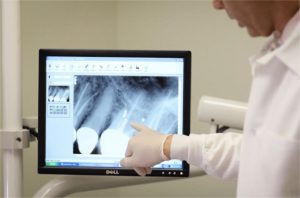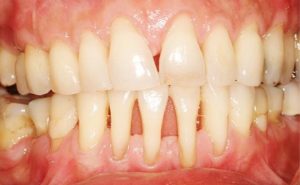Tooth sensitivity is a sharp, quick pain you feel when your tooth comes into contact with particular food items. Tooth sensitivity is typically triggered by cold, hot, or sweets. For instance, eating ice cream, sipping a latte, or chewing candies may trigger tooth sensitivity. Having sensitive teeth is no fun! It may cause you to avoid eating or drinking things you like. So what causes tooth sensitivity? And how can you resolve it? Let's examine some common types of tooth sensitivity to better understand this phenomenon:

Tooth sensitivity is generally triggered by cold, hot, and/or sweets
Localized tooth sensitivity

Localized tooth sensitivity is when you're sensitivity is limited to a single tooth. The most common causes of localized tooth sensitivity are dental cavities or cracked teeth.
Tooth cavities
Your tooth may become sensitive because it has a cavity. As cavities penetrate past the outer tooth layer and into the dentin, the tooth becomes sensitive. This is particularly common when eating sweets, as well as cold items. This type of tooth sensitivity is common among teenagers who typically have one or more cavities. You need to see your dentist to take some X-rays and evaluate your teeth. If your dentist finds cavities, then you need to have them fixed. Luckily, a simple filling usually takes care of the problem and resolves your sensitivity.
Cracked tooth
Your teeth may crack under the bite forces which causes them to become sensitive. For example, you may chew something hard and all of a sudden a tooth with a previous filling on it breaks and becomes sensitive. This phenomenon is more common among older adults who have already had many of their teeth previously worked on. Cracked teeth can usually be fixed with a crown, although you may require a root canal if the fracture is too deep.
You shouldn't ignore the sensitive tooth. If left untreated, your sensitive tooth will turn into a full-blown toothache before you know it! Tooth sensitivity is your body's way of telling you that you must see the dentist. Otherwise, your tooth becomes infected or the fracture reaches the nerve. This is no longer tooth sensitivity as the pain is far worse. Unfortunately, your previously sensitive tooth now requires some serious dental work. Otherwise, you will lose the tooth. As you can see, the sooner you address tooth sensitivity, the better the outcome.
Generalized tooth sensitivity
Generalized tooth sensitivity is when you have multiple sensitive teeth, not just one. Let's take a look at a few common causes of generalized tooth sensitivity:
Gum Recession
The most common cause of generalized tooth sensitivity is receding gum tissue. Receding gums refers to the loss of supporting gum tissue that protects the teeth roots. As you lose gum tissue, your teeth roots start to become exposed. As a result, you experience sensitivity on several teeth, sometimes even all of your teeth.

The most common cause of generalized tooth sensitivity is receding gum tissue
The most common cause of gum recession is brushing too hard. The best solution is to learn to brush your teeth the correct way. Stop pressing hard and apply gentle, circular motions instead. Be sure to only use a soft toothbrush. Replace your old toothbrush periodically as worn-out and abrasive bristles are more likely to damage your gum tissue.
Loss of Tooth Enamel
Another cause of generalized tooth sensitivity is the loss of the tooth enamel layer. Enamel is the outermost tooth layer that protects the teeth. Your teeth become sensitive once the enamel layer becomes too thin. Here are a few different reasons why you may lose this precious tooth protection:
- Consuming high levels of acidic foods and drinks
- Carbonated sodas
- Persistent vomiting or acid exposure which is commonly seen with Bulimia Nervosa or GERD
- Heavy tooth grinding
- Constant clenching of your teeth
- Having multiple crowns that were on the opposing natural teeth
- Aggressive tooth-brushing
- Generally weak tooth structure
First, you need to figure out which one of these is causing your tooth sensitivity. For instance, if your diet is leading to enamel loss, then you should modify your eating habits. If your stomach acid is responsible for the enamel loss, then you need to treat the underlying medical condition. Also, drink lots of water and brush more frequently. Clenchers and tooth grinders need to relax and wear a custom nightguard. Finally, if you're damaging your teeth due to aggressive brushing habits, then modify your brushing technique. Alos, consider using a different toothbrush or switching to an electric toothbrush if you think it might help.
Temporary Tooth Sensitivity
There are a few circumstances that lead to tooth sensitivity that is temporary in nature. Temporary tooth sensitivity goes away within a few weeks or several months. Here are a few examples of scenarios that could potentially lead to temporary tooth sensitivity:
Sensitivity on new fillings and crowns
It's not unusual to become slightly sensitive after receiving a new filling or crown. These tooth sensitivities usually go away within several weeks. Other times they may last for a few months before they disappear. If your tooth sensitivity persists for more than three to four months, or if it worsens, then you should have it evaluated by your dentist. It could be that your filling or crown needs a simple adjustment. Contact your dentist to see if they prefer you to wait, or if it's time to go back for a follow-up appointment.
Sensitivity after teeth whitening
It's common to experience some tooth sensitivity after receiving professional tooth whitening from the dentist. The bleach the dentist uses is very strong, therefore it could make your teeth slightly sensitive. Luckily, most of these sensitivities go away within a couple of hours or days. The exception is if you use high concentrations of bleaching gel in an unsupervised setting. This can actually cause permanent tooth sensitivity. This is exactly why you should never use high concentrations of bleach without proper supervision.
Overdue dental cleaning
You may develop some tooth sensitivity just because you haven't cleaned your teeth in a while. Plaque and tartar buildup can actually cause tooth sensitivity. Hopefully, a dental cleaning will resolve this sensitivity. However, if left untreated, plaque and tartar cause gum disease which has serious and irreversible consequences. Be sure to maintain your regular dental cleanings to prevent your teeth from becoming sensitive.
How to resolve your tooth sensitivity?
The first step is to figure out the source of your tooth sensitivity. Note your symptoms and discuss them with your dentist. Here are some questions you need to answer in order to help your dentist identify the problem:

The first step to resolving tooth sensitivity is to figure out the source of your sensitivity
- Is your tooth sensitivity localized? or is it generalized?
- If localized, on which tooth do you feel the most sensitive?
- If generalized, are you sensitive to all four corners of the mouth or only a few of them?
- How long does your tooth sensitivity last? Seconds, minutes, hours, etc.
- What triggers your tooth sensitivity? Hot, cold, sweets, chewing, etc.
- Does your sensitivity worsen at a certain time of day? Mornings, nights, etc.
Discuss your symptoms with your dentist to figure out the source of your tooth sensitivity. Afterward, start coming up with a plan to resolve the tooth sensitivity. Your dentist may recommend a Fluoride toothpaste, gel, or rinse to help strengthen your teeth. They may recommend wearing a custom nightguard if grinding is suspected. The most advanced cases will require invasive dental work such as crowns, root canals, etc. Don't wait until your sensitive tooth turns into a full-blown toothache! Contact your dentist and get your sensitivity under control before it's too late.
0 Comments